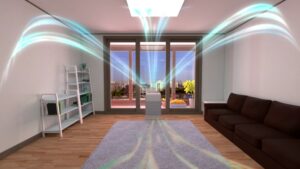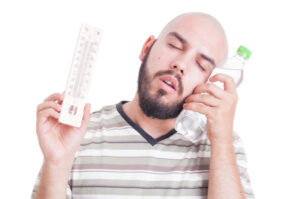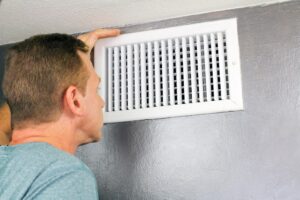Selecting The Correct Air Filter For Your Needs
Purchasing the right air filtration system can do wonders for improving the indoor air quality in the home. However, when picking a system you should be aware of the characteristics of different types of air filters. This will make sure your new filter will fit your AC unit and meet your needs.
BASIC AIR CLEANERS
Purchasing the right air filtration system can do wonders for improving the indoor air quality in the home. However, when picking a system you should be aware of the characteristics of different types of air filters. This will make sure your new filter will fit your AC unit and meet your needs.
BASIC AIR CLEANERS
These filters are the most common in HVAC systems that work by trapping air pollutants as the air passes through the filter material. They need to be changed monthly to ensure optimal efficiency. Filters with lower MERV ratings are typically made of fiberglass, while higher efficiency filters are pleated or made of polyester.
HEPA FILTERS
Although HEPA filters technically fall into the previous category, they are able to filter much finer particles thanks to their high efficiency. Not all AC systems are built to handle HEPA filters so make sure to check this before getting one for your home or business.
IONIZERS, OZONE GENERATORS, AND ELECTROSTATIC FILTERS
Ionic air filters and ozone generators produce charged ions or ozone. As airborne particles, neutrally charged, come into contact with these negatively charged ions or ozone, they take on the electrical charge and stick to different surfaces in the room and are removed from the air stream.
Similarly, electrostatic air filters work by charging airborne particles and trapping them on negative and positive charged plates. These plates are removable, as they should be cleaned or washed to ensure good performance of the filter. Electrostatic filters also produce ozone.
ACTIVATED CARBON FILTERS
carbon is usually used as an addition to another air purification system. These filters are designed to remove gasses and odors from the air by trapping them in the carbon’s pores. They can absorb different types of chemicals and are effective at filtering cigarette smoke.
These filters use ultraviolet light technology to neutralize microbes, mold, and, if properly utilized, even viruses. Ultraviolet light damages the DNA of these organisms and stops their reproduction, preventing the spread of illnesses. They are often installed with another air filter to maximize the removal of airborne particles and the killing of bacteria and germs.
What is the best type of air filter for a home?
The air filtration system you choose for your home will depend mainly on your specific circumstances and the particulates you wish to filter. Here’s what different air filters are built to remove or reduce.
•Dust: if you’re looking for an air filter that can remove or reduce the amount of dust in your home, even the filters with the lowest efficiency ratings (MERV 1-4) will do the work.
• Mold, pollen, dust mites: individuals who suffer from allergies or other respiratory issues should look for filters with MERV ratings ranging from 5 to 8.
• Volatile organic compounds: filters with MERV ratings from 8 to 16, as well as those with activated carbon inserts, can capture VOCs and odors in your home.
• Bacteria: if you are particularly sensitive to bacteria or suffer from a chronic illness, you should look for hospital-grade filters with ratings ranging from 13 to 17.
• Viruses: HEPA filters and UV light filters are effective against virus-sized particles. However, not all HVAC systems are built to handle HEPA filters.
You should choose an air filtration system based on your individual needs and health concerns. By far the best way to determine the right filter for your home is to consult air quality professionals who will make sure that your air purification system meets your needs and fits your HVAC system without overwhelming it. Give us a call at Browning Heating and Air today for all your Gainesville heating and cooling needs.
These filters are the most common in HVAC systems that work by trapping air pollutants as the air passes through the filter material. They need to be changed monthly to ensure optimal efficiency. Filters with lower MERV ratings are typically made of fiberglass, while higher efficiency filters are pleated or made of polyester.
HEPA FILTERS
Although HEPA filters technically fall into the previous category, they are able to filter much finer particles thanks to their high efficiency. Not all AC systems are built to handle HEPA filters so make sure to check this before getting one for your home or business.
IONIZERS, OZONE GENERATORS, AND ELECTROSTATIC FILTERS
Ionic air filters and ozone generators produce charged ions or ozone. As airborne particles, neutrally charged, come into contact with these negatively charged ions or ozone, they take on the electrical charge and stick to different surfaces in the room and are removed from the air stream.
Similarly, electrostatic air filters work by charging airborne particles and trapping them on negative and positive charged plates. These plates are removable, as they should be cleaned or washed to ensure good performance of the filter. Electrostatic filters also produce ozone.
ACTIVATED CARBON FILTERS
carbon is usually used as an addition to another air purification system. These filters are designed to remove gasses and odors from the air by trapping them in the carbon’s pores. They can absorb different types of chemicals and are effective at filtering cigarette smoke.
These filters use ultraviolet light technology to neutralize microbes, mold, and, if properly utilized, even viruses. Ultraviolet light damages the DNA of these organisms and stops their reproduction, preventing the spread of illnesses. They are often installed with another air filter to maximize the removal of airborne particles and the killing of bacteria and germs.
What is the best type of air filter for a home?
The air filtration system you choose for your home will depend mainly on your specific circumstances and the particulates you wish to filter. Here’s what different air filters are built to remove or reduce.
•Dust: if you’re looking for an air filter that can remove or reduce the amount of dust in your home, even the filters with the lowest efficiency ratings (MERV 1-4) will do the work.
• Mold, pollen, dust mites: individuals who suffer from allergies or other respiratory issues should look for filters with MERV ratings ranging from 5 to 8.
• Volatile organic compounds: filters with MERV ratings from 8 to 16, as well as those with activated carbon inserts, can capture VOCs and odors in your home.
• Bacteria: if you are particularly sensitive to bacteria or suffer from a chronic illness, you should look for hospital-grade filters with ratings ranging from 13 to 17.
• Viruses: HEPA filters and UV light filters are effective against virus-sized particles. However, not all HVAC systems are built to handle HEPA filters.
You should choose an air filtration system based on your individual needs and health concerns. By far the best way to determine the right filter for your home is to consult air quality professionals who will make sure that your air purification system meets your needs and fits your HVAC system without overwhelming it. Give us a call at Browning Heating and Air today for all your Gainesville heating and cooling needs.
You May Also Like

Minimizing Airborne Particulate Matter Indoors in Waldo, FL
Indoor air might look clean, but in places like Waldo, FL, where humidity is high and pollen is always present, it often… Continue Reading Minimizing Airborne Particulate Matter Indoors in Waldo, FL…

Symptoms of an Ailing AC Condensing Coil in Newberry, FL
In a place like Newberry, FL, where the summer heat and humidity don’t take a day off, having a reliable air conditioner… Continue Reading Symptoms of an Ailing AC Condensing Coil in Newberry, FL…

Why Does My AC Make My House Stink in Newberry, FL?
When the summer heat and Florida humidity crank up in Newberry, FL, your air conditioner goes into overdrive to keep your home… Continue Reading Why Does My AC Make My House Stink in Newberry, FL?…
